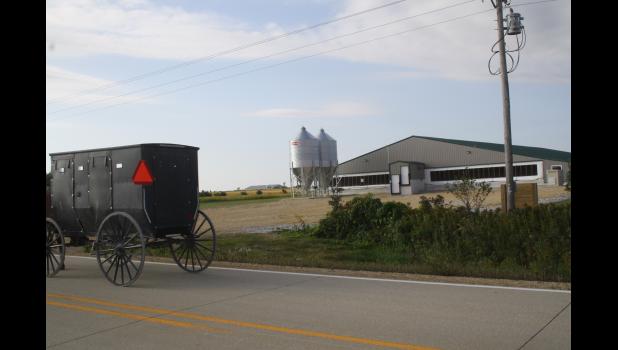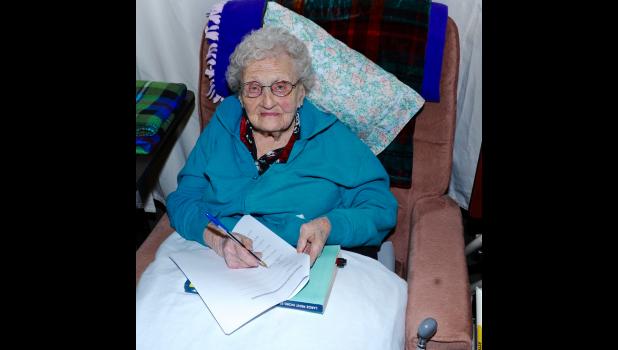Neighborhood takes on big hog
Thu, 10/05/2017 - 10:31am
admin
—5,500 acres cannot be used for CAFO or liquid manure in Howard County
By:
Marcie Klomp News Editor tpdeditor@crescotimes.com
Howard County - There is a small group of people in Howard County who are putting the saying “One person can make a difference” to the test.
A group of neighbors, Northeast Iowans for Clean Air and Water (NEICAW), is fighting Concentrated Animal Feeding Operations (CAFOs) by forming a covenant. Families in mostly Albion Township but also Forest City, Howard Center and Vernon Springs have signed the legal promise to each other that they and any future owners of their land will not allow a CAFO to be built on the property and will not allow liquid manure to be spread on those acres.
Those 43 families include 16 Amish families; 63 separate properties and about 5,500 acres. The covenant needs to be re-recorder at the county courthouse every 21 years.
“We are hoping it will help our neighborhood and other neighborhoods in the future keep CAFOs away,” Sue George said.
Back in February 2017, neighbors in Albion Town-ship heard a hog confinement building was going to be built in their neighborhood. Immediately, the neighborhood started organizing. Jerry and Sue George, members of NEICAW, hosted the first of many neighborhood potlucks for new and old friends to brainstorm how to stop the construction.
The group found satellite pictures depicting the location of known sink holes in the area as well as documentation on some sink holes that were not officially recorded. CAFOs are required to be built a certain distance from a sink hole.
Many from the group attended the March 20 Board of Supervisors meeting to discuss their concerns. They were told the county’s hands are tied as those building the confinements are required to follow a manure management plan for facilities under 2,500 head, and a master matrix is required if over 2,500 head. If they get enough points and if there is no lawful reason to deny it, they are passed by the DNR, which is why so many confinements are being built. As of Sept. 30, 2017 Howard County currently has 126 hog CAFOs, along with 14 open feed lots (dairy) that are active and regulated. There are also 12 in the process of being constructed, according to Marshall Rogne of Howard County Environmental Health.
“We started with the supervisors. We went in prepared and talked about sink holes. We learned about karst (limestone) topography (which is conducive to sink holes). We tried everything,” Sue said. “We always thought we’d get somewhere because of the sink holes but the DNR (who approves the applications) can’t do much.”
It is the state legislature that makes the law, with the current law being passed in spring 2002.
The Georges have even talked to many in the DNR, including Director Chuck Gipp. “We had to do something, but we were getting nowhere,” Sue continued. “We were told nothing could be done. Our group wasn’t ready to give up. We knew we had to start thinking outside the box.”
Obviously air quality is an issue with neighbors, but the neighborhood is also worried about water quality.
“What percentage of air is your air? What percentage of water is your water? It belongs to all of us,” Jerry stated.
“The Amish were involved early on,” Sue commented. “Their concern is for water and their organic farming.” In addition many wells, especially on Amish farms, are shallow, which is a concern to all in the neighborhood.
In the meantime, a second CAFO was constructed in the neighborhood. The first was stalled for a time and moved to a different portion of the property, just around the corner from the other.
“We started the process innocently, thinking we could take care of it, then realized that wasn’t a possibility,” Sue noted.
Although the band of neighbors has not been able to stop two CAFOs from going into the area, they are hoping to help others fight the battle. Jerry explained, “The attorney (Karl Knudson of Decorah) is hoping the covenant is a tool for others to use.” It was already used by a group of four neighbors in Winneshiek County, so Howard County’s covenant with 43 families, is much bigger.
“The information (about the covenant) should get out, so other Iowans can try it in their neighborhoods. The covenant that we wrote is very basic. It will not allow the construction of CAFOs on our lands and prevents liquid manure from being spread on our properties. The covenant could be used as is or adapted in other locations. We want to make the process easier for the next area to try,” Sue stated. “It gives home owners hope that their properties won’t be depreciated or worry that they would have to move to get away from air and water pollution.”
Both confinements are up and running, and the neighborhood can certainly smell that it is there. “We feel sorry for the Amish who live close by. We can shut the windows and use the air conditioner. They don’t have that option,” Sue related.
One Amish neighbor conveyed his thoughts about the covenant, “It is a great idea.” He went on saying, “There’s only one thing wrong with it. It should have happened 10 years ago.”
Sue added, “Another Amish neighbor, after reading a recent article in the Farm Bureau Spokesman, expressed how the Farm Bureau is concentrating on promoting the big farms. He commented the information in the article was about big agriculture. They are no longer focusing on the smaller farmer. He decided, as we already have, that this will be the last year that he belongs to the Farm Bureau. He said that they won’t be getting his $45 next time. We have heard several neighbors who state that they plan to do the same thing, those being non-Amish neighbors.”
One Amish farmer told Sue one morning when they woke up, the smell was so awful that she had to close up all the windows in the house. They have to do that even if it is a very hot day. They don’t know how they will stand it. They are worried about how it might affect their health. If the wind is from the south, these same neighbors smell another nearby confinement.
It has been an up-and-down ride for the neighborhood, and they are not done. “When you know things, you should share that information,” Sue said. She has been invited to attend meetings in other counties to share ideas like these. “This isn’t anything I planned on in my retirement, but we’ve met some wonderful people.”
Hoping to get the word out and get more ideas, the group formed the Northeast Iowans for Clean Air and Water Facebook page. They gained friends and shared thoughts and plans.
Sue remarked, “Yes, we have learned that those who told us it was impossible to stop a confinement were correct. We tried everything we could, and then more. The results were we now have a group of people who are more dedicated than ever to stop the spread of CAFOs across our beautiful state.
“We will continue to stand up for those who love living in the country. We will stand up for clean air and water. We will continue to hold our ground.”



